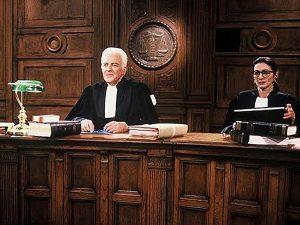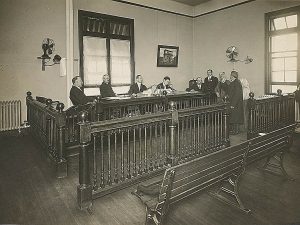R v Mayberry [1973] Qd R 211: The case of R v Mayberry is a prominent case under principal offenders as parties to an offence under criminal responsibility. The offence in issue was rape, particularly in respect of the issue of consent as well as the liability of a party who aids the commission of the offence of rape after penetrations had taken place.

This case afforded an opportunity for the court to give interpretation to the combined reading of sections 6, and 7 and 347 of the Criminal Code. The case was determined at the trial court from where it went on appeal at the criminal court of appeal.
Recommended: Differences Between Negligence and Recklessness
Issues determined In R v Mayberry
1. Whether the offence of rape becomes complete upon penetration
2. Whether the knowledge of the fact that an offence is likely to be committed makes one a party to the offence.
Also see: Most Lucrative Areas of Law

Fact Summary of R v Mayberry
The complainant, Hall together with Kay, were on their way to the city. There were to enter the city by bus but then, the appellants, Mayberry and Goodall offered them a lift and the accepted after a while thought. After they moved the appellants dropped by a filling station and filled their petrol tank along Ipswich; direction not leading to the city.
After had got petrol they drove to a place far away from the city and arrived at a lonely spot along bush areas. Goodall was able to mount pressure on Kay, so they got down from the car and went some miles away. There, they heard Hall scream as Mayberry was struggling to have sexual intercourse with her. Hall’s friend Kay, wanted to go over to the car and see what the screaming was for but she was held back by Gooddall.

Evidence were corroborated that it was at the point when Mayberry penetrated Hall’s vagina that the loud scream was heard. Hall and Kay were later dropped off by the appellants. Medical evidence showed that Hall was a virgin until Mayberry penetrated her vagina. Reports were made to the police accordingly and they began investigation. Upon interrogation, Mayberry admitted having carnal knowledge of Hall. He however, admitted that he frightened Hall but she allowed him to penetrate her.
Recommended: Differences Between Private And Public Trust
The evidence of Goodall and Kay corroborated the fact that Hall was screaming, asking Mayberry to stop and calling on Kay to come to her rescue. The evidence given by Goodall was equally in admittance of the alleged offence. He gave evidence that he was aware Mayberry wanted to have sex and had offered the ladies a lift for that purpose. He also gave evidence that the girls protested when they changed direction to Ipswich but they insisted and drove them to an otherwise location.
Goodall admitted to the charges for himself and as a witness called in by Mayberry. His evidence in chief was admittance entirely and consequently he was not cross-examined. At the trial, the defence counsel raised the issue of fact that the girls were going for a barbecue as was invited by an person unknown, but unfortunately, this line of cross-examination was counter-effective to the defense because it corroborated the fact that the girls were taken to a place they did not want to go (that is, the location where the rape took place).
Recommended: Differences Between A Contract And An Agreement
Decision Of The Court
The trial court convicted Mayberry and Goodall accordingly. Goodall by his act of preventing Kay from going to the scene when she was alerted facilitated the commission of rape and therefore makes him a party to the offence, even though he had not committed the offence in person. It was on the ground of their conviction at the trial court that they filled an appeal to the Criminal Court of Appeal contending the weight of evidence presented and admitted at the lower court.
![R v Mayberry [1973] Qd R 211](https://bscholarly.com/wp-content/uploads/2020/02/does-the-supreme-court-overrule-itself-cases-300x300.jpg)
Then, on the issue of Goodall being a party to the offence, the appellate court observed that the trial court gave the necessary explanation on the complicity of Goodall’s case to the jury as a party to the offence and a principal offender.
Recommended: Advantages and Disadvantages Of Hire Purchase
Reference was made to section 7 Paragraphs (a), (b) and (c) of the Criminal Code which provides for what qualifies one as a principal offender, particularly, paragraphs (b) and (c) which incriminates any act or omission done by a person to actually aid the commission of an offence or for the purpose of aiding or enabling the commission of an offence. The evidence given before the trial court as was assessed by the appellate court showed that Goodall had in fact assisted Mayberry my in the commission of rape by his positive step in preventing Kay from going to the scene when Hall was screaming.
Goodall had the knowledge of what was intended by Mayberry and the chances that rape was likely to occur if she withholds consent. His knowledge of the fact was shown by evidence as well as the overt acts which he manifested. Hanger C. J, delivering the lead Judgment in the Criminal Court of Appeal affirmed the conviction of the two appellants (Mayberry and Goodall) as principal offenders for the offence of rape.
Hanger C.J noted that the fact that penetration had occurred before the aid was given (since by the virtue of section 6 of the Criminal Code, rape is complete upon penetration) does not entail that what happens thereafter such as ejaculation, does not constitute act of rape. Therefore even though the positive act of Goodall which constituted aiding to the offence of rape had occurred after “penetration” had taken place, it still makes him guilty of aiding or enabling.
Also see: Difference Between Alliance And Coalition
This position of Hanger C.J was concurred to by Hart J. Skerman J. being the minority view, dissented to the majority view. He held that by the strict interpretation of sections 6 and 347 of the Criminal Code, the offence of rape becomes complete the very moment penetration takes place. In the instant case therefore, penetration had already taken place, after which Kay opted to offer help but was prevented by Goodall.
Therefore, rape was already complete and consequently, Goodall could not have possibly aided its commission. This position taken by Skerman .J is a logical one but it holds no water since it is a minority decision. Moreover, the decision of the majority is most acceptable in attainment of the purpose of the law. The appeal was dismissed in whole for lack of merit.

Edeh Samuel Chukwuemeka, ACMC, is a lawyer and a certified mediator/conciliator in Nigeria. He is also a developer with knowledge in various programming languages. Samuel is determined to leverage his skills in technology, SEO, and legal practice to revolutionize the legal profession worldwide by creating web and mobile applications that simplify legal research. Sam is also passionate about educating and providing valuable information to people.